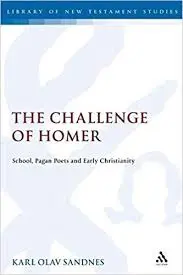

The Challenge of Homer: School, Pagan Poets and Early Christianity
in Library of New Testament Studies
Pages
336
Publisher
T&T Clark
Published
2009
ISBN-13
9780567426642
Homer was the gateway to education, to the skills of reading and writing. These skills were necessary for the nascent Church. Knowledge of Homer's writings was a sign of Greekness, of at-home-ness in the society. Education was embedded in the mythology, immorality and idolatry of these writings. This challenged the Christians. This study presents how Christians responded to this. The opinions varied from rejection of Homer and all pagan literature, considering them works of the Devil, to critical involvement with this literature.
This study attempts to trace the discourse on Homer and education among the Christians back to the New Testament. The topic does not come to the surface, but it is argued that in Paul's letters contrasting attitudes towards the propaideutic logic and the philosophical principle of usus (making right use of) are present. He opposed a logic wherein Christian faith represented the peak of education, the culmination of liberal studies. In his instruction on how to relate to the pagan world, Paul argues in accordance with the principle of usus. The New Testament is not so dependent upon the Homeric poems, as assumed by some scholars.
The first Christians faced two hermeneutical challenges of fundamental importance: that of interpreting the Old Testament and how to cope with the Greek legacy embedded in Homer. The latter is not explicitly raised in the New Testament. But since the art of interpreting any text, presupposes reading skills, conveyed through liberal studies, the Homeric challenge must have been of outmost importance.
This study attempts to trace the discourse on Homer and education among the Christians back to the New Testament. The topic does not come to the surface, but it is argued that in Paul's letters contrasting attitudes towards the propaideutic logic and the philosophical principle of usus (making right use of) are present. He opposed a logic wherein Christian faith represented the peak of education, the culmination of liberal studies. In his instruction on how to relate to the pagan world, Paul argues in accordance with the principle of usus. The New Testament is not so dependent upon the Homeric poems, as assumed by some scholars.
The first Christians faced two hermeneutical challenges of fundamental importance: that of interpreting the Old Testament and how to cope with the Greek legacy embedded in Homer. The latter is not explicitly raised in the New Testament. But since the art of interpreting any text, presupposes reading skills, conveyed through liberal studies, the Homeric challenge must have been of outmost importance.
- Table of contents
- Part One: School, Homer and Encyclical Education in Antiquity
- 1. Introduction
- 2. School in the Greco-Roman World
- 3. The Pivotal Role of Homer
- 4. Knowledge and Formation: The Insufficiency of Encyclical Education
- 5. Philo of Alexandria: A Hellenistic Jew on Greek Education
- 6. Summary of Part One
- Part Two: The Christian Agôn over Encyclical Studies in the First Four Centuries C.E.
- 7. Justin Martyr, his student Tatian and Two Ps.Justins
- 8. The Apostolic Tradition: Prohibited Occupations
- 9. The Teaching of the Apostles (Didaskalia Apostolorum) and Syriac tradition: "Avoid all the Books of the Gentiles"
- 10. Tertullian: Learning but not Teaching Encyclical Studies
- 11. Clement and Origen: Christian Teachers in Alexandria
- 11.1 Clement of Alexandria: Propaideia Protects Faith
- 11.2 Origen: The Silver and Gold of the Egyptians
- 11.3 Origen and Celsos: Christian faith for the Unlearned?
- 11.4 The Alexandrian 'Summary'
- 12. Flavius Claudius Julianus - Emperor and Apostate: Christian Teachers are Immoral
- 13. The Cappadocian Fathers
- 13.1 Basil of Caesarea/Basil the Great: Ad Adolescentes
- 13.2 Gregory of Nazianzus' Encomium for Basil
- 13.3 Gregory of Nyssa's Life of Moses
- 14. Jerome: An Ascetic Addicted to Greek Learning
- 15. Augustine: Liberal Studies - A Window on the Relationship between Greek Culture and Christian Faith
- 16. Summary of Part Two
- 16.1 Common Ground
- 16.2 Opposition to Encyclical Studies
- 16.3 Encyclical Studies cannot be avoided
- 16.4 Advocates of Encyclical Studies
- 16.5 Arguments Employed in the Debate
- 16.5.1 The Critics
- 16.5.2 Advocates
- 16.5.3 Acting like Bees
- 16.5.4 All or Nothing?
- Part Three: Looking Back to the New Testament
- 17. The New Testament and Encyclical Studies
- 17.1 General Observations
- 17.2 Paul on Encyclical Studies
- 17.3 Summarizing Paul on Encyclical Studies?
- 18. Conclusions
- Bibliography
- Index of References
- Index of Authors